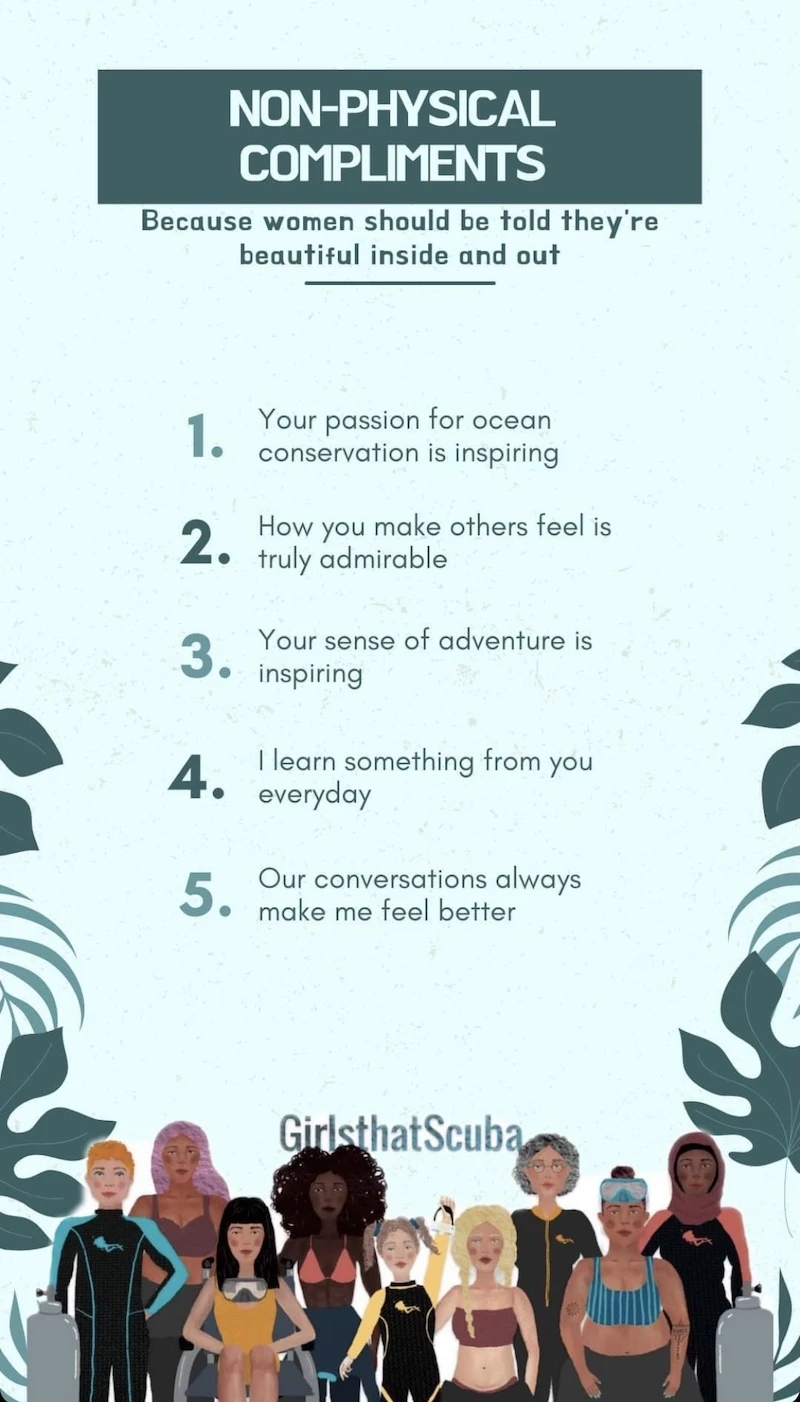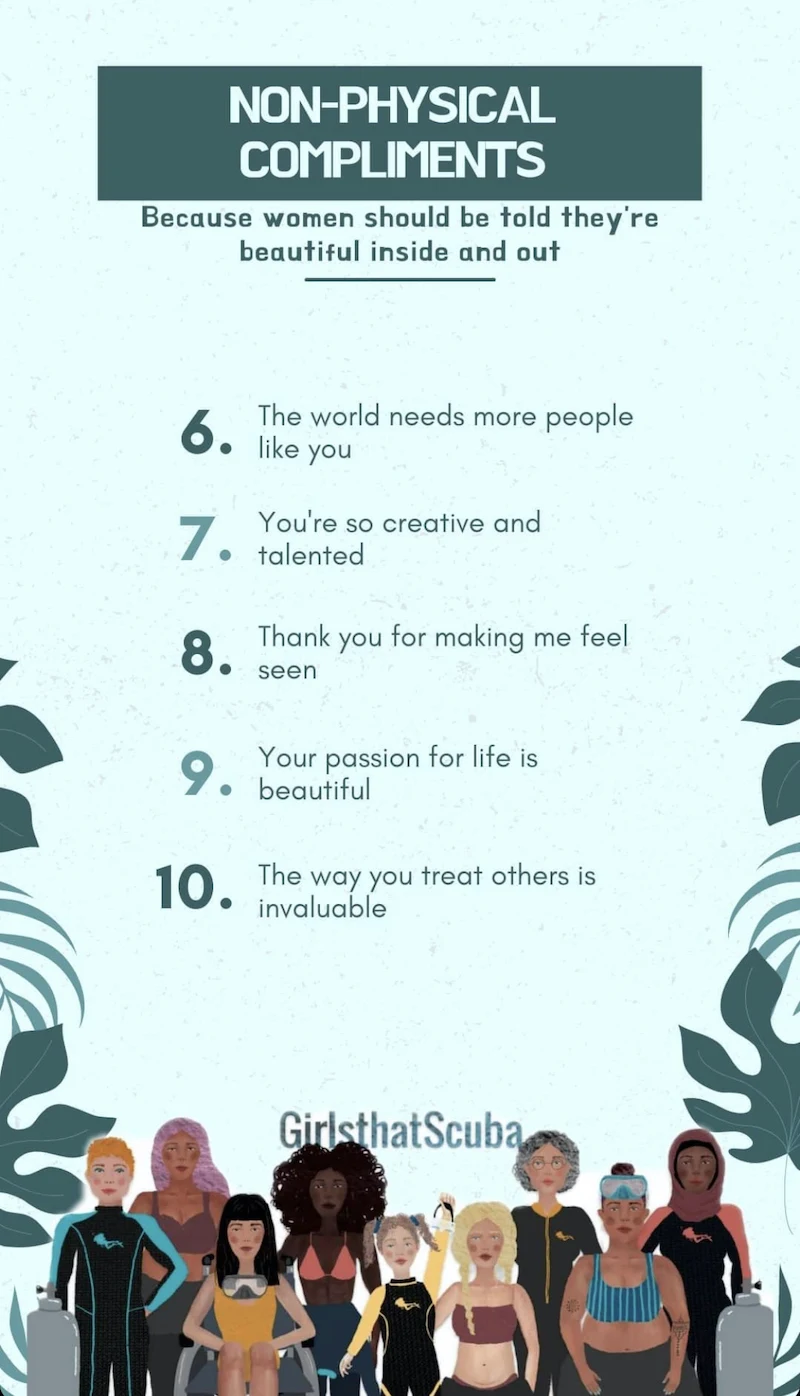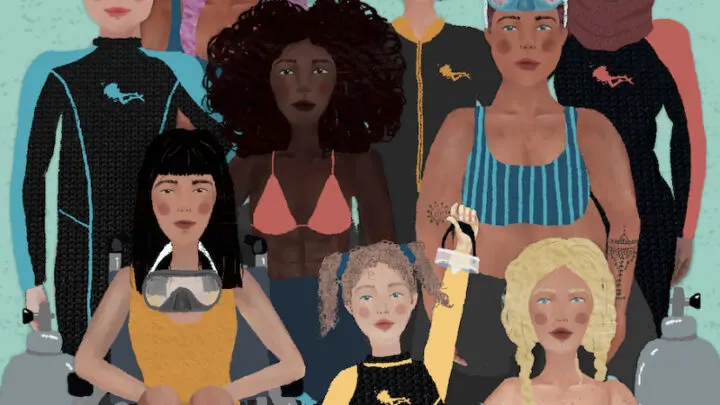Of the entry level and continuing education certifications issued by PADI in 2020, only 36.8% of new divers certified were women vs 63.2% men. We have a huge way to go to close this gap, but instead of simply calling out the issues of sexism in the scuba industry we wanted to offer some guidance.
It’s important to start by recognising that in raising women up, we’re not erasing men from the picture. As many Instagram infographics like to point out, equality is not like a pie – sharing it out doesn’t mean there are less rights for the next person. We’re not writing this with the intention of tearing down men in scuba diving. We’re empowering all divers with suggestions for how we can move forward towards a more inclusive and welcoming industry for people of all genders.
If you want to learn to be a better ally to female scuba divers, read on for our 10 practical suggestions of ways to raise women up in scuba diving.
1. Provide space for all women in diving
“If there’s Girls that Scuba, why can’t we have Guys that Scuba?”. It’s the age old question which we’ve been asked more times than we care to count. Providing space for specific groups is an important part of allyship, so instead of questioning their existence we need to allow specific spaces for women to exist. We also need to ensure trans women are included in advocacy for women divers.
This extends beyond online spaces and into physical dive locations, too. If you’re a dive operator setting up a new venture – whether it’s a training pool, facilities at a popular dive site, or a whole dive school – consult a diverse range of people on what they need, including divers with disabilities.
For women, helpful considerations might include having rental equipment specifically designed for women, smaller masks, or more inclusive size ranges in rental wetsuits. Don’t forget to ditch the innuendo on shop signage and avoid selling t-shirts emblazoned with sexist jokes.
2. Create more opportunities for women to join us
If we want to take the next step beyond just making scuba spaces inclusive and welcoming to women, we need actively encourage more women to join dive communities to bridge the certification gap.
Think creatively about how you can invite more young women into your dive operation and into the underwater world. Why not partner with local Girl Guides or Girl Scout initiatives, or offer try dive days to women’s groups in your local area?
3. Speak up to be supportive
Use your privilege to bring forward change in the dive community by supporting others. Know what’s going on in your space – whether that’s an in-person dive club or any online communities you’re involved in – and take responsibility for your role in it.
It’s not enough to not be sexist and claim to not be sexist – you have to learn to recognise sexist behaviours and actively speak up against inappropriate speech and actions when you recognise them. Speaking up sets the precedent that sexist behaviour won’t be tolerated, and creates a more inclusive environment by normalising other people speaking up for women. In turn, this builds accountability and creates a trusting space.
In response to being called out, many people like to make comments such as “I don’t see women any differently,” or, “We treat the women just the same as the men in our dive shop”. This can feel harmful to people who have experienced sexism (reminder: that’s a lot of us).
Comments like these can invalidate peoples’ experiences. They erase the fact that as women we do often experience the diving world differently due to the inherent sexism in a male-dominated industry.
4. Listen to women
If someone chooses to confide in you about something they’ve experienced, take them seriously. It’s all too common for women to be told they’re exaggerating, for their opinions to be dismissed, or for them to be gaslit into believing a situation wasn’t as damaging as they initially felt. Listen to what they have to say, and learn from what they’re telling you.
Equally, if a woman is coming to you to discuss something harmful you’ve done towards them, take the feedback on board without becoming defensive. Learning about our own privilege – whether that’s due to gender, sexuality, race, ability, religion, or any number of other factors – is never an easy journey.
It often leads us to recall harmful behaviours and systems we’ve contributed to in the past, which can sometimes cause us to feel defensive. Instead of leaning into the defensiveness, use resources like this one to learn from the situation.
If you’re reading this article and recognising some of your own behaviour, use it as an opportunity to reflect and evaluate how you might behave differently in the future.
5. Stop mansplaining
In the diving world, we have to comprehend scientific concepts and understand complex equipment. Some men thrive on having the opportunity to excessively explain things to women, with a condescending undertone of “You’re a woman, you wouldn’t understand.”
Unless someone has asked you to explain something to them, or you know with 100% certainty that you’re more qualified than them, then it’s possible you’re mansplaining.
6. Don’t assume anyone’s skills or strength
On the topic of qualifications, you should never assume a diver’s certification level before speaking to them. This is true regardless of gender, but women in particular often seem to face assumptions that they’re less certified than the men they’re buddied with. Assume that every diver is equally certified until you’re told otherwise.
This also applies to the classic “Let me carry that heavy cylinder for you” bravado which can undermine the strength and experience of female divers. Allow women to carry and assemble their equipment the same as you would with other divers. If they need help, they’ll ask for it.
Similarly, if you’re an instructor remember to treat all students the same regardless of gender. In mixed gender groups instructors can sometimes “take it easy” on women, but ultimately this doesn’t make good divers in the long term.
7. Focus on our diving skills, not our outfits
When it comes to offering up compliments to other divers, complement them on their abilities instead of their appearance. Don’t comment on women’s clothing or swimwear choices, regardless of whether it’s complementary or not. Think – would you say the same thing to a man?
If you wouldn’t complement a guy on their choice of swimwear, you shouldn’t be doing it to women either. (However, if you want to complement the expensive regs we splurged on, we’re all ears).
Equally, if a woman chooses to present herself on her own social platforms in a way which you perceive as sexy (such as posing in swimwear), recognise that it is still her right to present her body in the way that she chooses. If you only see that image as sexual, reflect on why you’ve been conditioned to think that way. Just because a woman chooses to post a bikini photo, it does not mean she should be treated any differently – we shouldn’t have to cover up to be taken seriously.
Non-physical compliments to use instead


8. Call out problematic advertising
These bikini photos can take on a different meaning when the gaze and purpose is shifted. Swimwear is an inherent part of diving in tropical locations, yet it can be problematic when women divers in swimwear are excessively sexualised in order to sell something. Twice in the last year our community has seen and called out instances of sexist advertising, where women’s bodies have been used unnecessarily to draw attention to advertisements.
We also regularly see images of men in drysuits or technical equipment completing challenging dives, yet the accompanying imagery of women divers may just be them holding a dive mask whilst wearing a bikini.
Learn to recognise and call out this problematic advertising in the diving world. If you’re a shop owner, look more analytically at the advertising which is given to you to sell products. Offer feedback to dive brands and training agencies when they choose to excessively sexualise women whilst portraying men as skillful and powerful.
9. Celebrate diverse women in diving imagery
As well as representing women in more realistic diving scenarios, we also need more realistic representation of the diverse range of women divers who are out there.
There are divers of all ages, races, sizes, religions, and abilities right here in our Girls that Scuba community, yet it’s rare to see this represented in diving advertisements. Dive brands – we’re sure that out of 60,000 scuba women we can help you find some more diverse diving models!
10. Hire women
There are many divers who say that they prefer being taught by women, and it can often be comforting for women who are new to the diving world to have another woman diver there at the start of their journey.
If you’re a dive operator, hiring more women as instructors is likely to bring more of us into your community and help to close the certification gender gap. If you’re passionate about being taught by women, seek out women as instructors for your own education.
We hope that this post has given you some practical ideas for how you can be a better ally and help to raise women up in diving. Remember, this advice applies to people of all genders! As divers we need to celebrate other women in the diving industry too, and embrace communities (like this one) which advocate for creating a more inclusive dive industry.
Do you know a diver who needs to read this? Perhaps you know a scuba brand or dive school which could be offering up better representation for female divers? Share this with whoever needs to read it, and be sure to tag us @girlsthatscuba!

